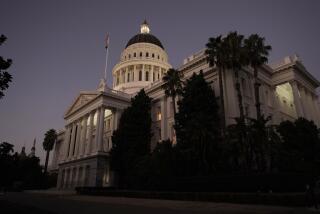Making Money Move
- Share via
Congress is moving ahead on legislation to put a halt to the practice of banks to hold money transferred by check for prolonged periods of time before crediting the funds to clients’ accounts. It is a good step, as Californians, already protected by a constructive state law, can attest.
Both houses of Congress have, at one time or another, approved legislation on what is called delayed availability of funds, indicating that final action is likely this year. The House voted last month to approve one version. The Senate Banking Committee has scheduled spring action on a broader bill to address this among several other banking issues.
The California Legislature, in 1983, adopted legislation by Assemblyman Willie Brown (D-San Francisco) that placed limits on how long banks can hold funds. Under those rules, all government checks and cashier’s checks must be credited on the business day following deposit. For other checks, there is a sliding scale: two working days if the check is drawn on a bank headquartered in the same city; eight days if the check is drawn on an out of state bank but in a city with a Federal Reserve Bank; longer for others, including some larger checks or the bank can demonstrate a good faith belief that there is special risk.
Congressional hearings, like state investigations that preceded them, have generated testimony indicating many abuses by banks. The testimony also showed that the fear of the banks that the time limits on holding checks would encourage abuse was not justified. Tight, national rules would assure fairness to all.
More to Read
Get the L.A. Times Politics newsletter
Deeply reported insights into legislation, politics and policy from Sacramento, Washington and beyond. In your inbox twice per week.
You may occasionally receive promotional content from the Los Angeles Times.










